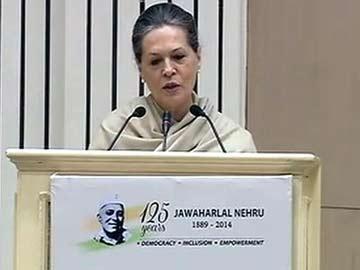There could be no India minus secularism: Sonia recalls Nehru

New Delhi: Congress president Sonia Gandhi on Monday said the values promoted by India's first prime minister Jawaharlal Nehru continue to remain relevant, and secularism was a compelling need without which there could be no India.
Speaking at an international conference organised by the Congress to commemorate Nehru's 125th birth anniversary, Gandhi made veiled attacks on the BJP, saying Nehru's life and work had been "drowned out by misinterpretation and distortion in recent years".
Prime Minister Narendra Modi was not invited to the two-day meet, raising some eyebrows in the Bharatiya Janata Party.
The event held by Congress to resurrect Nehru's legacy at a trying time for the party saw the presence of leaders from many parties.
West Bengal Chief Minister and Trinamool Congress chief Mamata Banerjee, Communist Party of India-Marxist leaders Prakash Karat and Sitaram Yechury and Janata Dal-United chief Sharad Yadav were among those present.
Many leaders of parties of undivided Janata Dal were there, but no senior Samajwadi Party leader was present.
Foreign leaders present included former Afghan president Hamid Karzai, former Ghana president John Kufuor, Queen Mother of Bhutan Ashi Dorji Wangmo Wangchuck, former Nepal prime minister Madhav Nepal and former Egyptian foreign minister Amr Moussa.
The event was also attended by leaders from the Communist Party of China.
Gandhi said that although Nehru was a socialist by conviction, he valued individual liberty above all else.
She said secularism was an article of faith with Nehru.
"If any person raises his hand to strike down another on ground of religion, I shall fight him to the last breath of my life as head of the government and from outside," she quoted Nehru as saying.
The Congress president said there could be no 'Indianness' and no India without secularism.
"Secularism was and remains more than an ideal. It is a compelling necessity in a country as diverse as India."
She took potshots at the Bharatiya Janata Party at the start of her speech.
"Jawaharlal Nehru once remarked that wealth shouts but knowledge whispers. That whisper of knowledge about Nehru's life and work has weakened in recent years in our country, drowned out by misinterpretation and distortion. Yet the ideas he promoted and the values for which he stood remain all the more relevant," Gandhi said.
She said Nehru was once compared to a sculptor, called upon to work on a massive block of granite encompassing one sixth of the human race.
"Out of that block of granite, Nehru built a state, a nation, a democracy. He nurtured democracy as a mother nurtures her child."
After the Lok Sabha debacle and further electoral shocks in Haryana and Maharashtra this year, Gandhi cited Nehru and urged party workers not to feel dejected, saying they were on the right path.
She described Nehru as one of the greatest Indians.
The theme of the two-day conference was "Nehru's world view and his Legacy - Democracy, Inclusion and Empowerment".
In his speech, Karzai, who had studied in Shimla, said "Nehru, for us, was a name of household conversation."
Kufuor said Nehru was an inspiration in his country's aspiration for independence.
Ashi Dorji Wangmo Wangchuck said Nehru had invited the king of Bhutan as the chief guest at a Republic Day parade in the mid-1950s and helped end the country's policy of self-imposed isolation.
Madhav K. Nepal recalled Nehru's role in founding the Non-Aligned Movement (NAM).
Moussa said Nehru was an avid supporter of the ideals of the United Nations to sort out problems.
CPI-M leaders later said they went to the event to remember Nehru's contribution to India's development and nothing should be read into their sharing a platform with Mamata Banerjee.
They said the event was not linked to the formation of any anti-BJP front.
BJP leader Subramanian Swamy, a trenchant critic of the Congress, took potshots at Nehru at a book release function here.
"There is no record whatsoever in our parliamentary history that Nehru consulted his cabinet before going to the United Nations with the (Kashmir) issue," he said.




